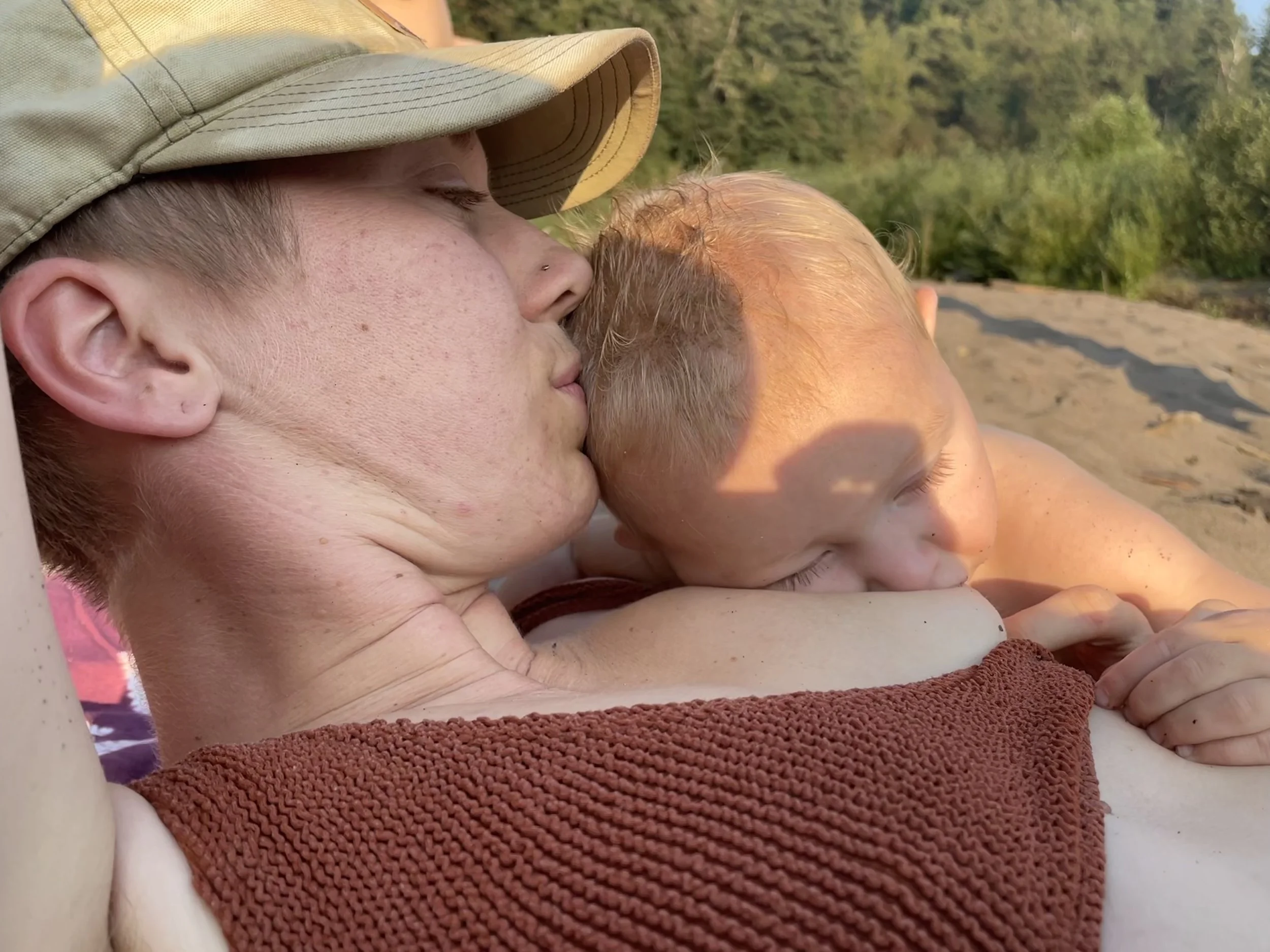On Belonging & Milk
My baby has four teeth.
At ten months, this child writhes and crawls over my body on waking, at bedtime. Nuzzling, sometimes nosediving, into my belly, into my breasts.
To the central star of the nipple. My nipples are raw, pulled, sucked with such force that they fall back into slackened areolas, which were, up until a year ago full, light against gravity, and uninitiated.
I am what has been called this baby’s “non-gestational mother”. Mother, archetypal, genderqueer. While our baby grew in the womb of my love, I dreamed with them, felt my womb swell, saw their face when I closed my eyes. I took herbs to bring milk. Three times a day, enough tincture to convince my body of our shared pregnancy. That there would be a babe to feed.
At six months pregnant we found colostrum. Viscous, pale yellow. A miracle.
Without my full understanding, the herbs were making me emotionally unstable. Primal rage bigger than anything I’d ever felt. Intrusive thoughts, anxiousness. Mostly rage though. Protection. Cortisol coursing through my body. Preparing. As an evolutionary strategy it made sense. I was animal. And I had a thousand suns of energy to protect my child, my partner. Any situation of injustice inflamed me, far beyond my personality’s baseline of maternal ferocity.
The final month of our pregnancy I pumped every two hours. I set alarms on my phone: “drink water”, “eat oatmeal”, “protein!!”, pump”. The kitchen I worked in didn’t have a pump room or an office, so I took my breaks, sitting on the toilet or on the floor, sometimes finding a corner of sidewalk around the block, trying to convince my milk ducts of a baby still tucked in the fertile dark of my partner’s uterus.
Anyone who has used a breast pump would tell you it’s a particular sensation. The nerves in my teeth alarming as the pump vaccumed my nipples, begging for milk. Little drops, enough to wet the bottom of the bottle, but never accumulate. The lactation consultant, a witch in scrubs with a basement office downtown, said, keep pumping, wait for your baby’s latch, more milk could come. I’d wake twice or three times in the night to pump.
We birthed in our bedroom. When my hands felt the waterbreathing creature of our child slip from my beloved’s body, when I saw their face I’d seen a thousand times, I became an ocean. The sea I had always sensed, pulled from, reached for, suddenly my body was that water. All resource, salt, love, made form, to be mother, mothers and child.
They nursed from me first. Minutes fresh into the world, brought to my chest, they latched, found those drops that I’d asked for months for my body to make.
A week into their life, more milk hadn’t come in. Still those few drops. Enough to fill their mouth once or twice. They nursed for comfort, and when my partner’s breasts overflowed. We shared feeds in the night. Once they’d gotten enough milk, my love would pass them to me to suckle and sleep. I stopped pumping, letting the natural rhythm of their nursing call forth the milk if it would, surrendering if not. I knew in my body, in a way I hadn’t understood before their birth, that this was my baby, I their mama. That that would be so, regardless of milk, of DNA, of what anyone else perceived. I am their mom because they asked me to be, because I said, and every day since, continue to say “yes”. This is the work of the parent. Devotion. Beyond reason, beyond physics. I stopped taking the herbs.
I thought when I started writing this, at the “non-carrying parent” prompt, that I’d write about language, about how all the labels people offer to define my role, begin with a negative. You are ‘not the birthing parent’, ‘not the biological parent’. Negating my blood in this child. How my body has swollen and ached with them. How people refer to my partner as “your mom”, singular, when talking to our child, in front of both of us, parenting and nursing them in equal measure. How people look questioningly at me, unsure and thus unwilling, to offer me a title, a name. I can feel heartbroken for this misunderstanding. I can, and have, especially at the interface of beaurocracy, feel rage at my erasure. I can spin into grief and fear about how the world will let my baby understand their belonging to me. But this isn’t the center, is not the headline of our experience.
We choose the privilege and the praxis of sourcing our belonging in our connection. In our days spent becoming alongside eachother. Sleeping close enough for our bodies to harmonize in the night. Pressing skin to skin, discovering the delight of leaves, letting water buoy us. This is how we are family. Sleep offered up at the altar, daipers changed, cries soothed. I am their mom, no-“non” required, their “Ima” - because of how they reach up to hold my face when they’re facing out to the world how they have my crooked smile, how I feel in my body when they have a need.
Now my partner weans, their body urgent for autonomy, for physical energy. And our baby sucks my nipples raw in the night. I’m not ready to cut this cord for them, for me.
This baby who makes me Ima, sleeps now, heavy across my body, latched, their palm resting in the center of my chest.
—By Kate H.
